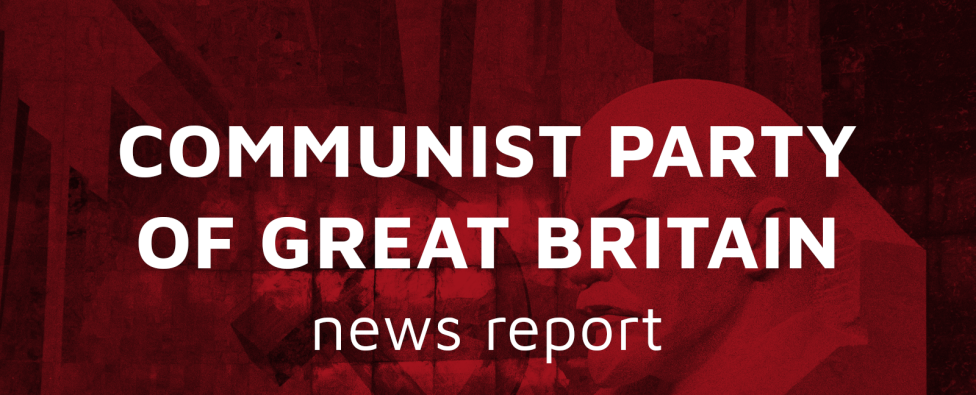Report on the ongoing programmatic debate within the CPGB as it makes tweaks to the Draft Programme. This report was originally published in WW1344, which can be found here
Back to nature
On April 18 Communist Party members met online to discuss section 3.3 of our Draft programme,1 which details immediate demands relating to the environment. The current formulations are largely correct and there have been no calls for major surgery; but new developments and the mood of urgency that now surrounds this topic have pointed to the need for a number of tweaks to sharpen the demands.
Jack Conrad submitted a draft of the new text, and comrades have been discussing this informally over the last few weeks on the party’s online discussion forum. He began by accepting the suggestion to amend section 1.4 in the Draft programme by changing “100 years” to “250 years”. Though our epoch, the epoch of the revolutionary transition from capitalism to communism, began in 1917, around 100 years ago, clearly, capitalism’s despoliation of nature has being going on for more than ‘100 years’, though, of course, it has grown apace and now threatens to bring about “runaway” climate change and maybe even civilizational collapse.2
He described how the human contribution to global warming is now an accepted scientific fact. He predicted many pious speeches and solemn pledges at the UN climate change conference (COP26) – due to be held in Glasgow in November this year. But narrow state interests and the drive for profit will undermine, at least in part, even sincere efforts.
Comrade Conrad explained that the immediate demands in section 3 are measures to be implemented now, as part of a programme that can be introduced under capitalism, and that communists would establish a government on the basis of such a programme. Many demands seek to articulate the political economy of the working class, but – like the achievement of the national health service, for example – are technically realisable under capitalism.
Concerns
Comrade Conrad then addressed four areas where comrades have raised concerns. The first was the call to encourage home working. Comrades were concerned that this would atomise the working class, making it much harder to organise collectively and participate in solidarity actions. The environmental benefit of working from home was also questioned: savings on travel being offset by the necessity of heating individual homes.
Comrade Conrad countered that, although factories and offices bring large numbers of workers together, it does not follow that they become centres for working class militancy. For instance, the Foxconn electronics factory in China, the largest in the world, employs between 250,000 and 400,000 workers, but working conditions remain harsh with the closest control being exercised by both the employer and the state. Modern home working keeps workers in touch via electronic business platforms like Teams, and other media can be used for more confidential communications away from the boss.
The comrade pointed to the huge amount of time and energy wasted in daily journeys to and from work. It is normal for workers in central London to live some considerable distance away, and to spend two hours or more a day commuting. Given that many workers travel to work by car, the removal of these journeys is a big carbon saving that more than compensates for the extra energy used at home.
Clearly home working is not appropriate for jobs in sectors like manufacturing and distribution, but it is an option for many office jobs. Some homes are unsuitable as workspaces, and for some workers the office is a welcome break from oppressive domestic arrangements. The proposed new wording states that home working should be encouraged rather than enforced. We also favour giving workers the ability to choose a mix of some days working at home and some in the office.
Next he turned to the call for protection for marine life in general, and fish stocks in particular. The new wording calls for inshore seas to include wide non-fishing areas. This is because generally fish spawn in sheltered waters, and here too you find the juvenile fish. It tends to be the mature fish that venture further away from the coast. The waters around Britain have been massively over-fished. They are able to sustain huge fish populations, and to bring about a recovery we need to enforce non-fishing zones in coastal waters.
Moving on to the issue of energy sources, Jack introduced the proposed new wording which states: “Replace coal, oil, gas and nuclear with wind, tidal, solar, geothermal and other renewable power sources.” This makes clear our opposition to nuclear power stations. These typically take a very long time to construct, and then provide very expensive electricity – more expensive than any other power source. He also questioned the trustworthiness of capitalist governments around the world to manage the safety issues. The nuclear power industry may have a good safety record, but when accidents happen they can be disastrous and pollute large areas with radioactive material that persists for generations.
Regarding renewable energy sources, comrade Conrad said he has been impressed by the scale of the contribution these provide to Britain’s energy supply. Over Easter 2021 80% of electrical power came from renewables. The weather was bright and blowy. Looking forward, he suggested that new homes should increasingly be heated using geothermal technology: that is, heat from below the ground. And he also suggested we consider plans to transmit electricity to Europe from arrays of solar panels in the Sahara desert.
Finally he turned to the controversial proposal to re-wild large areas of the British countryside. This involves re-establishing wild forests, natural floodplains, marshes, fens and heathland, and re-introducing native flora and fauna. And this includes bringing back the natural predators at the top of the animal food chain, wolves. Without them other animals like deer require human intervention to cull populations. Prime targets for restoring woodlands would be grouse moors, deer-stalking estates and upland sheep runs.
Debate
First into the discussion was Ollie Hughes. He remained unconvinced about possibilities for organising workers who are working from home. How could you go on strike? Would you need to take down the server used for team working? And how do you organise a virtual picket line? He was unhappy about the removal of the demand for re-establishing the intimate connection between town and country, and reversing the concentration of the population in London and south-east England. Finally, on fishing, he felt it was necessary to explicitly call for a ban on bottom trawling, where heavy nets sweep along the ocean floor, catching everything and destroying habitats in their wake.
Jim Nelson welcomed the clarification regarding inshore seas, but he still thought confining fishing bans to these areas would be insufficient, and he wondered how the bans could be enforced. Justin White was unhappy that we want to ‘encourage’ home working – he felt this was being forced on workers as a result of Covid-19 – and, for some, returning to office working might not be permitted, once the pandemic is over.
Anne McShane also felt that we are yet to see the real battles around home working. During the pandemic bosses have been reluctant to introduce unpopular measures, but once it is over they will be keen to fully monitor and control all of the workers’ time and activity. She also observed how traditionally you left work behind when you left the office building, but this boundary becomes blurred when you work from home, with bosses contacting workers in the evenings and at weekends. Sarah Stewart also had doubts about home working – especially because more time spent at home means more domestic mess to clear up, and this is usually a burden for the woman in the household.
Mike Macnair raised a number of issues with comrade Conrad’s opening. First he rejected the assertion that huge numbers commute by car, and consequently he felt the energy calculations favouring home working are wrong. He agreed that historically it was a desire for control that drove the centralising of production into factories, but the same push for control could force workers back into the home. He compared this with capitalism’s willingness to close down production facilities and reopen them in a new location with a cheaper, more compliant workforce.
On energy sources, comrade Macnair noted that renewables struggle to provide a consistent supply 24/7. This is partly due to the unpredictability of the weather. He drew attention to the large-battery solution employed in South Australia and the problems that had resulted. On the proposed reforestation at the expense of sheep farming, Mike claimed that much of the forests were cut or burnt in Neolithic times, and the resulting peat bogs made reforestation impossible. He also suggested that woollen clothing is vastly preferable to cotton.
The debate highlighted that many areas still require clarification, so the aggregate agreed to put off a vote on the new text to allow time for further discussion.
Vernon Price

